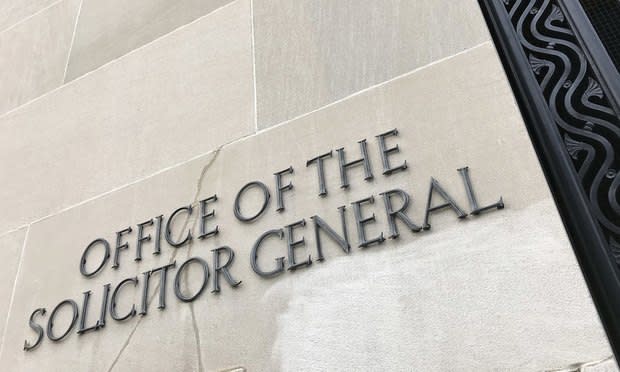Justice Dept. Frets About Kavanaugh Recusal in Challenge to CFPB's Power

Office of the Solicitor General at the U.S. Department of Justice in Washington, D.C. Credit: Mike Scarcella/ NLJ
The Trump administration's U.S. Justice Department wants to challenge the power of the Consumer Financial Protection Bureau, but is urging the U.S. Supreme Court to wait to take a case that would not require recently confirmed Justice Brett Kavanaugh to recuse.
In State National Bank of Big Spring v. Mnuchin, the Justice Department said this week that it agrees with the bank's argument that the restriction on the president's power to remove the bureau's director violates the Constitution's separation of powers.
But the issue should be decided by the full court, and that is unlikely in the State National Bank case, the Justice Department told the court. Kavanaugh would have to recuse based on his earlier participation in the case in the U.S. Court of Appeals for the D.C. Circuit, where he wrote a panel opinion reviving the bank's challenge to the consumer bureau.
Kavanaugh, as a D.C. Circuit judge, had long criticized the power of the Obama-era agency, and the Justice Department would likely count on his favorable vote in any case that confronted the independence of the agency's single-director structure. In the 2016 case PHH Corp. v. Consumer Financial Protection Bureau, Kavanaugh, writing for the panel majority, assailed "the concentration of massive, unchecked power in a single director."
"Particularly for a question of this magnitude, the court may wish to wait for a vehicle in which all nine justices are likely to participate," wrote acting Solicitor General Jeffrey Wall, who is substituting for U.S. Solicitor General Noel Francisco. Francisco's former law firm—Jones Day—is an amicus counsel in the case, representing the Buckeye Institute for Public Policy Studies.
There's no shortage of challenges to the CFPB pending in federal appeals courts. Wall pointed to other challenges that may not pose the same obstacles to full court consideration: CFPB v. RD Legal Funding (Second Circuit); CFPB v. All American Cash Checking Inc. (Fifth Circuit), and CFPB v. Seila Law (Ninth Circuit).
State National Bank, represented by O'Melveny & Myers partner Gregory Jacob, lost its constitutional challenge in August when the D.C. Circuit applied its January en banc decision in PHH Corp. In the PHH case, a 7-3 court upheld the independent agency's constitutionality. PHH, which had won relief on $109 million in penalties imposed by the bureau, did not petition for high court review.
Kavanaugh, in a his dissent in January, called independent agencies like the CFPB "a headless fourth branch of the U.S. Government." He wrote: "They hold enormous power over the economic and social life of the United States. Because of their massive power and the absence of presidential supervision and direction, independent agencies pose a significant threat to individual liberty and to the constitutional system of separation of powers and checks and balances."
In the high court, State National Bank poses three questions: whether the restriction on the president's power to remove the CFPB director only for "inefficiency, neglect of duty, or malfeasance in office" violates the separation of powers; whether Humphrey's Executor v. United States, upholding removal for cause of heads of independent agencies, should be overruled, and whether the fixed funding stream for the CFPB violates the separation of powers.
"In the history of the United States, no individual has ever wielded such expansive executive enforcement authority over an entire sector of private economic activity, devoid of the checks and balances the Constitution’s separation of powers requires," Jacob wrote in the State National Bank petition.
The petition was filed in September, after Kavanaugh's nomination but before his confirmation. Jacob was not immediately reached for comment Tuesday.
The Trump administration has sided against the CFPB in lower-court constitutional challenges. But the bureau, which possesses independent litigating authority in the lower courts but not at the Supreme Court, had defended its structure. Kathleen Kraninger, recently confirmed by the Senate as the new director of the CFPB, could decide to continue defending the bureau.
Wall asked the justices to wait and give Kraninger a "reasonable opportunity" to decide whether to defend the D.C. Circuit decision. If she chooses to defend the appeals court's judgment, Wall said, his office also needs time to decide whether to authorize the bureau to do so at the high court.
The Justice Department would ask the court to appoint an amicus to defend the D.C. Circuit's decision if Kraninger declines to argue on behalf of the bureau.
Read more:
Brett Kavanaugh Recuses From Three Upcoming SCOTUS Arguments
Gibson Dunn's Ted Olson Puts New Squeeze on Consumer Bureau
CFPB Suffers Another Appeals Court Loss Over Investigative Authority
D.C. Circuit's Brett Kavanaugh Doubles Down on Criticism of CFPB
What's Behind Brett Kavanaugh's 145 DC Circuit Recusals?



